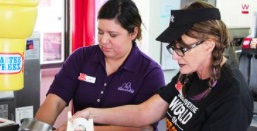Lesson 42 –
Mark 10:35-45 NRSV
35 James and John, the sons of Zebedee, came forward to him and said to him, “Teacher, we want you to do for us whatever we ask of you.” 36 And he said to them, “What is it you want me to do for you?” 37 And they said to him, “Grant us to sit, one at your right hand and one at your left, in your glory.” 38 But Jesus said to them, “You do not know what you are asking. Are you able to drink the cup that I drink or be baptized with the baptism that I am baptized with?” 39 They replied, “We are able.” Then Jesus said to them, “The cup that I drink you will drink; and with the baptism with which I am baptized, you will be baptized; 40 but to sit at my right hand or at my left is not mine to grant, but it is for those for whom it has been prepared.”
41 When the ten heard this, they began to be angry with James and John. 42 So Jesus called them and said to them, “You know that among the Gentiles those whom they recognize as their rulers lord it over them, and their great ones are tyrants over them. 43 But it is not so among you; but whoever wishes to become great among you must be your servant, 44 and whoever wishes to be first among you must be slave of all. 45 For the Son of Man came not to be served but to serve, and to give his life a ransom for many.”
Background
In this chapter of Mark, Jesus approaches the topic of divorce, prioritizes children, and speaks on the problem of wealth. He also speaks about his soon-coming death and resurrection but does so speaking in third person (“Son of Man”). This chapter is full of social and political debates that still resonate with us to this day. As you are reading this chapter in your own personal devotional period, consider why this might be the section where Jesus addresses hierarchies. Why do you think now is the time that the disciples would argue about the seating arrangements?
Today’s lesson will focus on ending hierarchies.
Read the scripture out loud together. What’s happening during this passage?
James and John come to Jesus and make a very strong request of him. They tell him they want him to “do for us whatever we ask of you.” Jesus only asks, “what is it?” And they reply, “allow us to sit, one at your right hand and one at your left, in your glory.” They want to be able to be on Jesus’ right and left side. Literally, it could be an indication of power at any table they might sit at. Metaphorically, they might be asking for more perks.
Jesus asks if they’re really ready for this. Are they ready for drinking from his cup? To be baptized with his baptism? They reply that they are able. Jesus replies, “you can drink from my cup, be baptized as I am, but I cannot reserve special seating for you. It’s not for me to grant.”
Overhearing this angered the other ten disciples. They were specifically angry with James and John. Jesus told the entire crew that, “Other people are lorded over by their rulers and are bossed by tyrants. That’s not how we do it here. Anyone who wants to be great must first become a servant, and whoever wants to be first, must be a servant of all. The Son Of Man came to serve and give his life for many.”
Why does the text name them as “sons of Zebedee?”
Highlighting James and John as “sons of Zebedee” helps establish a relationship between them. It raises the stakes of their request. It’s both sibling rivalry and an attempt to keep the kingdom in “the family.” In their defense, they asked a valid question. They wanted to know how to preserve their position. Where they went wrong was in forgetting that this isn’t how Jesus rolls. It is not something for Jesus to give away or even hold.
But Jesus is not intimidated by their asking, nor by the fact that they essentially double-teamed him. He stands his ground that this is not his opportunity “to grant.”
Servant?
As people of the African Diaspora, we rightfully have traumatic attachments to the word “servant.” So many of our people were (and continue to be) enslaved and exploited throughout history and across the globe. It is important to remember that Jesus’ world had oppression, but not exactly like the one we encounter. And still, even then, there were economic and ethnic hierarchies that made people less likely to be part of the mainstream community.
And Jesus uses this word “servant” often in his teachings as a way of pointing out the absurdity of class hierarchies. If “even the servant” has a real place of dignity in his ecosystem, then that means this is a completely different system than we are used to. If the one elevated must first be a slave of all, that means every other equation must be re-evaluated. If the one who is to become great must first be a servant, that means everything will change. Jesus is trying to make a point that he came to disrupt the ways of the world. You cannot leave Jesus the same way you came.
What questions do you still have of this scripture? How will you commit to journeying with this text this week?
 Connection to Today’s World
Connection to Today’s World
Undercover Boss is a reality show on CBS based on the premise that “the first shall be last.” It disorients workers and bosses by giving CEOs and other high-level folks an opportunity to see the day-to-day operations of their company. Eventually they reveal themselves. For most of the show, the staff have no clue that the “new hire” is actually their boss.
The fact that the daily workers have no clue that they’re working side-by-side with their boss is a clue about how removed the bosses are from the daily operations. Most workers are not in the social spaces that bosses are in. They would not likely socialize together, and they’re not likely to be in the same room together at the office either. Especially for national and international companies, it can be true that you’ll never meet the Boss, just someone who works under that person.
This creates, of course, some prime-time drama. In one episode, the CEO of Dippin’ Dots was able to see what the everyday workers experience. He learned that people were dealing with stress of ramped-up production, including early and late hours. He also learned that many customers complained about the price points of the ice cream cups.
One could argue that the show is a bit too sentimental. The bosses might learn for one day how the employees live, but what happens after that one day? Are they forever changed? How do they come to re-evaluate their visions for the company and the workers?
Journal: Is there someone you wish could see things from your point of view? Who is that and why?
Closing: Listen to “He’s That Kind of Friend,” sung by Walter Hawkins and Tremaine Hawkins
If you ever need a friend that sticks
Closer than any brother,
I recommend Jesus, Jesus;
Because He’s that kind of friend.
He will never forsake you, even though
He knows everything there is to know about you;
I recommend Jesus, Jesus;
Because He’s that kind of friend.
He’ll walk right in front of you
To always protect you,
So, the devil can’t do you no harm.
He’s faithful everyday
To help you along the way;
He’s that kind of friend.
Prayer:
Dear God, You watch over us as we fight over titles and positions. You weep when we compete for resources and fame. You’ve given us more than enough to sustain us.
You have no interest in special seating arrangements. As much as we want to be closer to you, you find ways to be closer to us. You speak to us and pursue a closer relationship with us daily.
Help us to destroy the hierarchies that put distance between us and You. Help us destroy the hierarchies that put distance between us and our fellow humans. Show us how to be first to serve each other. In Jesus’ name we pray, Amen
WORKS CITED
https://www.cbs.com/shows/undercover_boss/photos/





